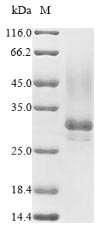CUSABIO transfected the expression vector which inserted the recombinant DNA into the E.coli, cultured the cells, and then induced the transcription and translation of the cloned vector. The N-terminal 10xHis tag sequence was appended to the gene coding for the E.coli of the Synsepalum dulcificum MIR protein to form the recombinant DNA. The recombinant Synsepalum dulcificum MIR was expressed as N-terminal 10xHis-tagged fusion. The purity of the protein is greater than 85% assayed by SDS-PAGE. It has an apparent molecular weight of approximately 30 kDa.
Miraculin is a glycoprotein with taste-modifying activity and is isolated from miracle fruit (Synsepalum dulcificum). The protein can modify human's taste and turn a sour taste to a sweet taste. Recombinant miraculin was expressed in transgenic tomato plants, and was properly processed. Miraculin accumulated in transgenic tomato plants to levels higher than those in transgenic lettuce plants. This property of miraculin is helpful for preventing lifestyle diseases in that it can be used
as a low-calorie sweetener or as an additive for foods targeting diabetics, as it removes the need for sugar. The active principle of the berry is the protein miraculin, which by itself is not sweet. Unlike sweet proteins, it has the unusual property of being able to turn a sour taste into a sweet taste. Sour foods, such as lemons, limes and grapefruit, taste sweet when tasted together with this protein. Namely, Miraculin by itself is not sweet, but it is able to turn a sour taste into a sweet taste. This unique property has led to increasing interest in this protein.






